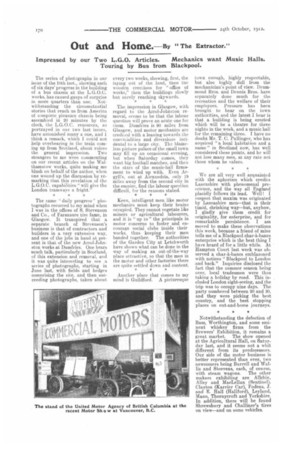Out and Home.—By " The Extractor."
Page 16

If you've noticed an error in this article please click here to report it so we can fix it.
Impressed by our Two L.G.O. Articles. Mechanics want Music Halls.
Touring by Bus from Blackpool.
The series of photographs in our issue of the 10th inst., showing each of six days' progress in the building of a bus chassis at the L.G.0.0. works, has caused gasps of surprise in more quarters than one. Notwithstanding the circumstantial stories that reach us from America of complete pleasure chassis being assembled in 20 minutes by the clock, the L.G.O.C. resources, as portrayed in our two last. issues, have astonished many a one, and I. think a remark, which I could not help overhearing in the train coming up from Scotland, about voices the general impression. Two strangers to me were commenting on our recent articles on the Walthamstow works, quite making me blush on behalf of the author, when one wound up the discussion by remarking that this revelation of the L.G.O.C, capabilities "will give the London tramways a fright."
The same daily progress" photographs recurred to my mind when I was in the offices of S. Stevenson and Co., of Faransure tire fame, in Glasgow. It transpired that a separate branch of Stevenson's business is that of contractors and builders in a very extensive way, and one of the jobs in hand at present is that of the new Arrol-Johnston works at Dumfries. One hears much talk, particularly in Scotland. of this extension and removal, and it was quite interesting to see a series of photographs, starting in June last, with fields and hedges cornnrising the site, and then succeeding photographs, taken about
every two weeks, showing, first, the taying out of the land, then the wooden eretedietis for "office of works," then the buildings slowly but surely reaching skywards.
The impression in Glasgow, with regard to the Arrol-Johnston removal, seems to be that the labour question will prove an acute one for them. Dumfries is 90 miles from Glasgow, and motor mechanics are credited with a leaning towards the convivialities and diversions incidental to a large city. The blameless picture palace of the small town may fill up an occasional evening, but when Saturday comes, they want big football matches, and then
the stars of the music-hall firmament to wind up with. Even Ar gyli's, out at Alexandria, only 19 miles away from the second city. in the empire, find the labour question difficult, for the reasons stated.
Keen, intelligent men like motor mechanics must keep their brains occupied. They cannot vegetate like miners or agricultural labourers, and it is " up to" the principals in motor concerns to foster and encourage social clubs inside their works, thus keeping their men banded together. The authorities of the Garden City at Letchworth have shown what can be done in the way of making an out-of-the-way place attractive, so that the men in the motor and other factories there are quite settled down and content.
Another place that comes to ray mind is Guildford. A picturesque town enough, highly respectable, but also highly dull from the meahanicianes point of view. Drummond Bros. and Dennis Bros. have separately done much for the recreation and the welfare of their employees, Preseure has been brought to bear on the town authorities, and the latest I hear is that a building is being erected which will be a theatre for three nights in the week, and a music hall for the remaining three. I have no doubt Mr. T. C. Pullinger, who has acquired " a local habitation and a name" in Scotland now, has well considered these points, and he will not lose many men, at any rate not those whom he values.
We are all very well acquainted with the aphorism which credits Lancashire with phenomenal prescience, and the way all England placidly follows its lead. Well 1 I suspect that maxim was originated by Lancashire men—that is their timid, shrinking way—but, anyhow, I gladly give them credit for originality, for enterprise, and for remarkable persistence. I am moved to make these observations this week, because a friend of mine tells me of a Blackpool char-A-banes enterprise which is the best thing I have heard of for a little while. At Hampton Court last week was observed a char-à-banes emblazoned with notices "Blackpool to London and back." Inquiries disclosed the fact that the summer season being over, local tradesmen were thus taking a, holiday by road. This included London sight-seeing, and the trip was to occupy nine days. The party numbered between 20 and 30, and they were picking the best country, and the best stopping places on out-and-home journeys.
Notwithstanding the defection of Bass, Worthington, and some eminent whiskey firms from the Brewers' Exhibition, it remains a great market. The show opened at the Agricultural Hall, on Saturday last., and it seems not a whit different from its predecessors. Our side of the motor business is better represented than ever, two newcomers being Burrell and Wallis and Steevens, each, of course, with steam wagons. The other makers exhibiting are AlIchin, Alley and MacLellan (Sentinel), Clayton (Karrier Car); Fodens, J. and E. Hall (Hanford), Leyland, Mann, Thornycroft and Yorkshire. In addition, there will be found Shrewsbury and Challiner's tires on view—and on some vehicles.






















